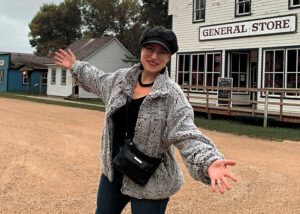In June 1942, 3,000 Mennonites gathered at the Kitchener, Ont., train station to bid farewell to conscientious objectors (COs) bound for forest-fire fighting and tree-planting camps in British Columbia. The local newspaper noted that the crowd, larger than any that had gathered for military troop departures, “was swelled by hundreds of curious citizens, who were attracted by the singing of hymns.”
During the Second World War, trains and trucks carried thousands of Mennonite COs away from home. Some of the young men went to work in road building and forest camps in northern Ontario and the Canadian west, while others toiled in essential labour in agriculture and industry. Some young women went overseas as nurses or relief workers, or into the paid workforce for the first time.
While not all went literally “into the woods,” saying no to military service and yes to pacifist convictions did take them all down an unblazed path along which they would discover much about themselves, their society and their world. Seventy-five years later, people forget how profound this dislocation was.
“Everything was new,” recalls Jake Peters, who, as a young married man, was sent to B.C. Alternative Service, the Canadian government program that allowed him and other COs to serve their country through non-military service was “all for the first time.”
Albert Erb, a young Amish Mennonite man, was 22 when he was sent to build roads in northern Ontario. Reflecting back, he sees this shock of the new as a positive experience. “Things just roll along too smoothly for us all the time,” he observed years later. “We should have a little setback once in a while, to set us straight.”
The requirement for all Canadian young men to provide some sort of military or alternative service was issued in 1940. They had to decide quickly where they stood at a moment when the possibility of an invasion of Britain by Hitler was very real. Under these circumstances, it is not surprising that some chose military service.
Those choosing Alternative Service had various initial motivations.
For Peter Neufeld, 22, his commitment to nonviolence ran deep. His father was murdered during the Russian civil war. Even after his family immigrated to Canada, young Peter was not allowed to own so much as a hunting rifle. When he declared himself a CO, he gave up his dream of learning to fly out of fear that this would make him a target of military recruitment.
By contrast, Doug Millar’s decision to become a CO was made less out of personal commitment and more out of deference to family and church. Doug felt that his time in alternative service was “an adventure, a vacation!” It was only afterwards that his conviction became personal. “The older I get,” he reflected years later, “the more I think that war is an absolute crime against humanity.”
“A lesson in human nature” was how Andrew Steckly described his experience in a work camp near Vancouver.
Of the 10,000 Canadian men who declared themselves COs, about 70 percent were Mennonite, while the rest came from other religious or non-religious backgrounds. They were rural and urban, farm boys and skilled workers. Steckly revelled in the diversity, spending a large portion of his 50 cents-a-day CO wage on film for his movie camera to capture camp life.
Relating to men in military service was another new experience, and for some a personal one.
Ray Good was at a CO camp when he heard his younger brother back home had “joined up.” According to Good, the family was disappointed but resigned to his brother’s choice, which also resulted in his excommunication from the Mennonite church. As a CO, Good sometimes fought forest fires with soldiers. He recalls no resentment from them as they worked side by side.
There are many stories of government-appointed camp foremen, themselves not conscientious objectors, who would rise to the COs’ defence if anyone called them cowards.
Many CO wives also blazed a trail by entering the paid workforce, challenging established gender roles of the day.
Erma Cressman went to work in a factory making military boots. Although her preference would have been not to work in a war industry, no Mennonite offered her an alternative job, and the church offered no significant financial support. “There was a lot of criticism at the plant,” she recalls. “Some said we bought our way. Others said if we couldn’t live on 50 cents a day then why didn’t my husband join the [military] service like other men?”
Nurse Edna Hunsperger felt strong pressure from other nurses to enlist. When she was offered the chance to serve with Mennonite Central Committee in England, she eagerly took the assignment.
Mennonite farm women took on new responsibilities. Sisters Anna and Ella Wideman were featured in a photo spread in the Toronto’s Star Weekly entitled “Girls man the farm front,” celebrating the resourcefulness of rural women in wartime.
Seventy-five years later most of these men and women are no longer with us, but echoes of their youthful voices live on in our Mennonite archives. Can we still learn from this generation on the move? After all, we live in different woods, with different trails to blaze. We can begin by listening to the echoes—the fears, challenges, hopes and convictions—of another generation that faced uncertainty and found their way into lives of peace and service.
Laureen Harder-Gissing is archivist-librarian at the Mennonite Archives of Ontario and Conrad Grebel University College. She curated the exhibit “Conchies speak: Ontario Mennonites in Alternative Service,” which runs until December 2016.
What would you ask a CO?
In the fall of 2015, Marlene Epp’s Mennonite history class at Conrad Grebel University College in Waterloo, Ont., created individual profiles of conscientious objectors (COs). Their primary source was 34 interviews conducted with COs in the 1970s by graduate student David Fransen and housed at the Mennonite Archives of Ontario at Grebel. In the course of the assignment, they were asked to generate one question that they wished they could have asked “their CO” if he were alive today. These are some of their questions:
• Do you think that if you were a single man without a child that your Alternative Service experience would have differed?
• You said, “I would have gladly done something more worthwhile” than the work that was assigned in the camps. If you could have chosen more worthwhile work, what would it have been?
• You said that you are impressed by the depth of knowledge that young people today have on conscientious objection. Do you think you and others had a trailblazing effect on future generations?
• Did your brother’s decision to join the air force affect your relationship with him once the war ended?
• You said you regretted that the church did not fully explain the peace stance. How would you change this so that young people today would have a better understanding of what it means to be a CO?
—Compiled by Laureen Harder-Gissing
More on conscientious objection
CO Bunkhouse
New book and film focus on conscientious objection
Contradicting the status quo
Stouffville to consider peace site and plaque
South Korean CO freed after 15 months
My taxes for peace, not war







Leave a Reply
You must be logged in to post a comment.